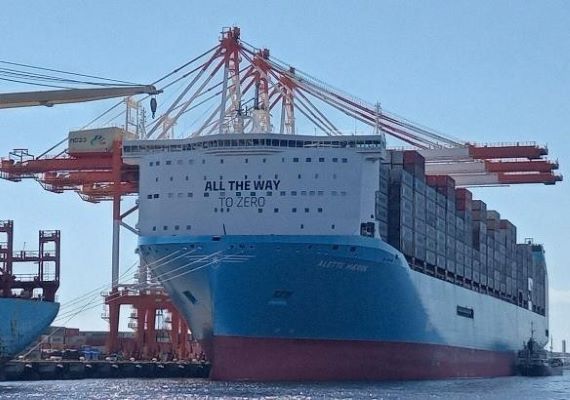Test demonstrates practicality of using methanol as marine fuel

Mitsubishi Gas Chemical (MGC) has been working with an increasing number of partners to facilitate the use of green methanol as a marine fuel in Japan, where demand is growing.
MGC participated as a methanol supplier for the simulation,, and together with Kokuka Sangyo, an MGC group company that provided a methanol carrier as the bunkering vessel, helped coordinate the equipment and expertise provided by the other participants, including to identify issues in operation from coming alongside up to connecting the two ships with hoses.
The City of Yokohama, Maersk and MGC signed a memorandum of understanding (MOU) last December to promote the utilization of green methanol at the Port of Yokohama and have since taken practical steps to realize their goal, including the recent simulation. Although established procedures exist for transferrin methanol between tankers that transport the chemical as cargo, the simulation was conducted as an important step toward establishing a method for replenishing fuel supplies for methanol-powered ships in Japan.
The simulation, supported by key partners contributing valuable assets, experience and know-how, has confirmed safe and practical methods as an important step toward not only methanol bunkering itself, but also the achievement of carbon neutrality in Japan. MGC, together with the other six parties, will use the knowledge gained from this simulation to study how to supply methanol as a marine fuel, including through cooperation with relevant government agencies.
Marine fuels account for about 2.5% of global CO2 emissions, and efforts to switch to alternative fuels to reduce greenhouse gas (GHG) emissions are increasing. Methanol is considered a clean fuel due to its low emissions of CO2 as well as nitrogen oxides (NOx), sulfur oxides (SOx) and particulate matter (PM) emission when burned. It is attracting interest as a carbon-neutral fuel, so increasing attempts are being pursued to produce methanol from biomass, waste, and CO2 and hydrogen from renewable energy sources.
In the international shipping market, methanol has begun to be used as an environmentally friendly alternative to heavy fuel oil, a non-renewable fossil resource, so the potential of methanol-fueled ships is receiving increasing attention. The number of such vessels is expected to increase in Japan, so the establishment of a methanol bunkering system at Japanese ports is seen as a key to reducing GHG emissions from shipping industry and maintaining the international competitiveness of Japanese ports.
Going forward, MGC is committed to contributing to carbon neutrality and related targets through its supply of green methanol.
Subscribe to our newsletter & stay updated.